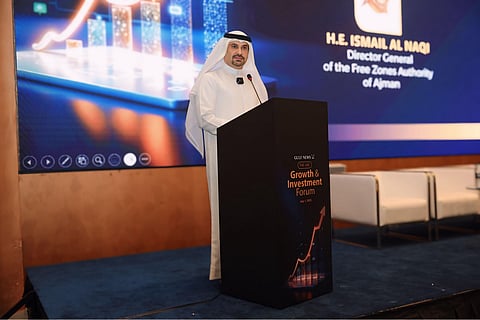UAE’s business-first strategy helps it punch above its weight in global trade and investment: Ismail Al Naqi
Director General of the Free Zones Authority of Ajman spoke at Gulf News' growth forum

The UAE’s long-term strategy of integration, economic diversification, and optimism is delivering results, raising its global trade profile well beyond its size and population, said Ismail Al Naqi, Director General of the Free Zones Authority of Ajman, during his keynote address at Gulf News' the UAE Growth & Investment Forum, currently underway at V Hotel Dubai at Al Habtoor City.
“The UAE is not just building the future, it is doing so with impact and clarity of purpose. This positive momentum reflects the aspirations of our leadership, our society and the many entrepreneurs and individuals who make up this unique nation,” Al Naqi said.
He pointed to international trade rankings and expanding global partnerships as evidence that the UAE’s approach is not only working, it is reshaping expectations.
“In terms of land size and population, we’re very small. But when it comes to merchandise exports, the UAE ranked 11th globally,” he said, referencing 2023 World Trade Organization data. “We’re ahead of many bigger nations.”
The UAE recorded $488 billion in exports in 2023, a number that is expected to rise further as Comprehensive Economic Partnership Agreements (CEPAs) signed with several countries take full effect. Al Naqi said he expects the country to climb higher in global rankings once the 2025 figures are released.
“This is not just a government achievement, it’s the outcome of a collective national effort,” he said. “Public sector, private sector, citizens and residents have all contributed to a shared economic vision,” he said.
Global repositioning
Reflecting on his recent trip through 12 cities in China and Vietnam, Al Naqi said he witnessed firsthand how both nations, despite their size and history, view the UAE with growing interest.
“As someone who has lived through the UAE’s transformation over the past 50 years, visiting these countries gave me a powerful reminder of how far we’ve come and what lies ahead,” he said, adding, “In the middle of global volatility, the UAE is emerging as a stable, strategic partner. That speaks volumes about what this country has built over the last 50 years.”
A key factor in the UAE’s global appeal, according to Al Naqi, is its inclusive, multicultural foundation. He described the country’s social fabric as one of its most powerful assets.
“Our greatest strength lies in our social fabric: over 200 nationalities, united by optimism, purpose and a drive to contribute,” he said. “What sets the UAE apart is the mindset.”
Free zones and a business-first approach
To explain the systemic efficiency behind the UAE’s success, Al Naqi shared what he termed his personal ‘economic hypothesis.’
“The UAE operates as a vertically integrated and horizontally homogeneous economic system,” he said.
He explained that vertical integration comes from coordination between federal initiatives and local implementation, while horizontal consistency is evident in how public institutions and private businesses work towards common objectives.
“At the federal level, the UAE’s international partnerships through BRICS, the World Trade Organization, and a growing list of CEPA agreements reflect a strong effort to open global markets. Locally, the coordination between free zones and mainland economic departments ensures ease of doing business,” he said.
He said the country’s free zones have become key drivers of this model.
“Free zones today offer a complete package – from licensing and employee residency to warehouses, smart desks, and virtual offices – all through a single-window system,” he said.
“This zero-bureaucracy approach is more than convenience, it’s a competitive edge that the UAE offers to all businesses, irrespective of their size.”
He also highlighted the role of national enablers such as Etihad Credit Insurance and the Emirates Development Bank, which are helping businesses access financing and expand internationally.
“The entire ecosystem is designed to empower businesses, open global pathways, and make the UAE the most agile, business-friendly destination in the world,” Al Naqi said. “Only the UAE, with this level of integration, mindset, and private-public collaboration, can deliver that."
Al Naqi quoted His Highness Shaikh Mohammad Bin Rashid Al Maktoum, Vice-President and Prime Minister of the UAE and Ruler of Dubai, to highlight a key driver of the nation’s economic strategy.
“Whatever is good for business is good for the UAE,” he said. “This is a defining principle behind the country’s growth model, and it has shaped my own vision. I hope to pass on this mindset to the next generation, whether they aspire to build businesses, serve the public, or represent the country.”
While acknowledging the progress already made, Al Naqi stressed that the country’s transformative journey is far from over.
“We are only at the beginning,” he said. “But we’re not just building the future, we’re building it with strategy, speed, and global impact.”
Sign up for the Daily Briefing
Get the latest news and updates straight to your inbox



